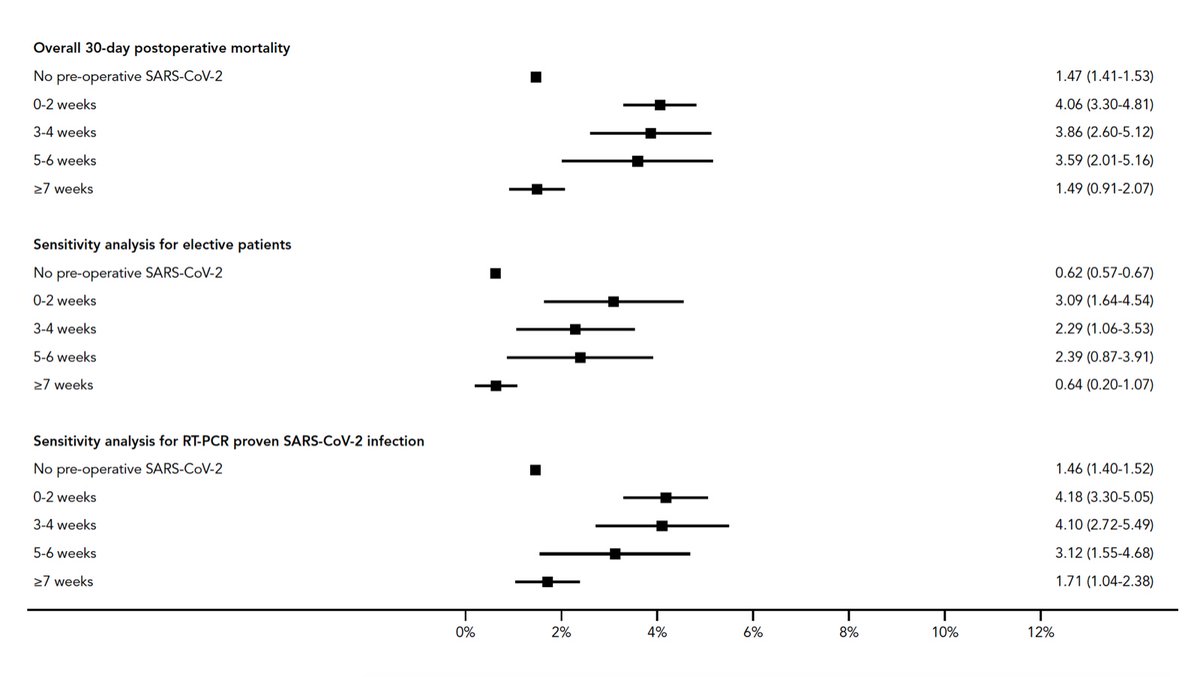
One year ago today @CovidSurg started.
It's been a tough year for everyone, both professionally and personally. @CovidSurg's priority has been to support surgeons & anaesthetists by providing these best possible evidence to inform surgical care during the pandemic.
It's been a tough year for everyone, both professionally and personally. @CovidSurg's priority has been to support surgeons & anaesthetists by providing these best possible evidence to inform surgical care during the pandemic.

As the pandemic has progressed, we constantly re-prioritised
Our early work included
▶️Natural history of perioperative SARS-CoV-2: thelancet.com/journals/lance…
▶️Burden of pandemic on surgical services: bjssjournals.onlinelibrary.wiley.com/doi/full/10.10…
▶️Early consensus guidance: academic.oup.com/bjs/article/10…
Our early work included
▶️Natural history of perioperative SARS-CoV-2: thelancet.com/journals/lance…
▶️Burden of pandemic on surgical services: bjssjournals.onlinelibrary.wiley.com/doi/full/10.10…
▶️Early consensus guidance: academic.oup.com/bjs/article/10…

We then pivoted to exploring how to mitigate SARS-CoV-2 risks for surgical patients
▶️COVID-free surgical pathways: ascopubs.org/doi/full/10.12…
▶️Preoperative swab screening: academic.oup.com/bjs/article/10…
▶️Timing of surgery in patients with previous SARS-Cov-2: …-publications.onlinelibrary.wiley.com/doi/full/10.11…
▶️COVID-free surgical pathways: ascopubs.org/doi/full/10.12…
▶️Preoperative swab screening: academic.oup.com/bjs/article/10…
▶️Timing of surgery in patients with previous SARS-Cov-2: …-publications.onlinelibrary.wiley.com/doi/full/10.11…

Our global team worked hard to engage colleagues around the work.
@CovidSurg's work has only been possible through the enthusiasm and dedication of >18,000 collaborators across >2,000 hospitals in 120 countries.
We are very grateful everyone who has contributed - thank you!
@CovidSurg's work has only been possible through the enthusiasm and dedication of >18,000 collaborators across >2,000 hospitals in 120 countries.
We are very grateful everyone who has contributed - thank you!

We completed three separate cohort studies in 2020; compressing workflows that usually take years in to months.
The speed of delivery and publication was made possible by massive teams working cohesively - thank you to our core operations & dissemination committees!
The speed of delivery and publication was made possible by massive teams working cohesively - thank you to our core operations & dissemination committees!

For each of our publications, our Dissemination Committee has focussed on sharing our research findings as widely, as possible with surgeons, anaesthetists and patients.
This is reflected in:
>Altmetrics
>Citations
>Media coverage
>Informing guidelines
This is reflected in:
>Altmetrics
>Citations
>Media coverage
>Informing guidelines

We also worked with patient groups to create dedicated patient resources in a variety of formats and languages: nihrglobalsurgery.org/surgeryduringc…
These resources cover
▶️Effects of COVID-19 on surgical patients
▶️What the hospital is doing to keep you safe
▶️What you can do to stay safe
These resources cover
▶️Effects of COVID-19 on surgical patients
▶️What the hospital is doing to keep you safe
▶️What you can do to stay safe

Over the next six months we will continue working to analyse the data we collected in 2020 and to disseminate our findings as rapidly as possible.
If you would like to receive updates on our work, please join our Telegram group - link: t.me/covidsurg
If you would like to receive updates on our work, please join our Telegram group - link: t.me/covidsurg
Huge thanks to our funders who made CovidSurg possible, including: @NIHRglobal, @BowelResearch, BDRF, @ACPGBI, @Augishealth, @BASO_ACS, British Gynaecological CancerSociety, @escp_tweets, @Sarcoma_UK, Urology Foundation, @VSGBI, @yorkshirecancer. We are very grateful for support!
Thanks once more to everyone who has contributed to CovidSurg over a very difficult year; everyone's contributions have been critical.
Thank you to all our patients who have allowed us to collect their data.
#SoMe4Surgery #GlobalSurgery
Thank you to all our patients who have allowed us to collect their data.
#SoMe4Surgery #GlobalSurgery
• • •
Missing some Tweet in this thread? You can try to
force a refresh




